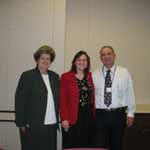
A master’s degree program in infectious diseases – with special emphasis on tuberculosis – will be established in the Reynosa-McAllen border region by this fall, thanks to a $290,000 grant from the U.S. Agency for International Development (USAID). The grant partners are the Health Science Center at San Antonio and the Universidad Autonoma de Tamaulipas (UAT) in Reynosa.
The U.S.-Mexico Training, Internships, Exchanges and Scholarships Partnership Initiative (TIES) grant is awarded by the Association Liaison Office for University Cooperation in Development, which is part of the USAID.
“We are proud to announce this initiative,” said Juan Jose Gonzalez Cabriales, M.E.S., dean of the School of Medicine at UAT. He is principal investigator on the grant with Richard A. Garcia Jr., assistant vice president for South Texas programs at the Health Science Center. “A binational curriculum committee will develop this project, and the curriculum will be delivered on site in Tamaulipas and in the United States by videoconferencing. We also envision other opportunities for continuing education in our region.”
“The grant is intended to foster institutional partnerships between U.S. and Mexican higher education institutions as articulated in the NAFTA agreement,” Garcia said. “Students entering this degree program at UAT will be graduates from medical and other health professions schools in Reynosa, Matamoros, Monterrey and Tampico, as well as from the veterinary school in Cuidad Victoria.”
Garcia said up to seven students in the master’s degree program will receive stipends to participate in infectious disease research projects at the soon-to-open Edinburg Medical Research Division of the Regional Academic Health Center. This would take place during the last semester of their two-year program. The Medical Research Division is operated by the Health Science Center.
Only two Texas institutions – the Health Science Center and The University of Texas at El Paso – were successful in their applications for TIES grants. UTEP is establishing a training, research and community outreach program for the prevention, diagnosis and control of tuberculosis and related infectious diseases.
After conclusion of an administrative and curriculum planning process, the master’s degree students will begin their course work in September of this year.
“It is our assessment that there are many health care professionals on both sides of the Rio Grande who essentially are ‘untapped’ professional resources in the fight against infectious diseases in the South Texas Border Region,” Garcia said. “This degree program will increase their capacity to research, diagnose, control and prevent tuberculosis and other infectious diseases within the binational communities they serve.”
TIES is a $50 million, eight-year collaborative program between the U.S. government, U.S. and Mexican educational institutions, and the private sector. TIES is designed to advance the objective of the Partnership for Prosperity, an initiative launched in 2001 by Presidents Bush and Fox. USAID is providing $35 million for TIES and the collaborating partners $15 million.
To date, 37 TIES partnerships have been established.
“Our Reynosa colleagues approached us about doing this project,” said Paula Winkler, M.Ed., director of the South Central Area Health Education Center at the Health Science Center and coordinator for the project. “The Health Science Center’s president, Dr. Francisco Cigarroa, has always said he would like to expand our activities beyond the border. This is the beginning of more partnership between the Health Science Center and UAT, and it meets the health care and research missions of both. We are very grateful to Luis Manuel Lopez, the Mexican consul in McAllen, who helped to facilitate meetings leading to the grant proposal for the new program.”

